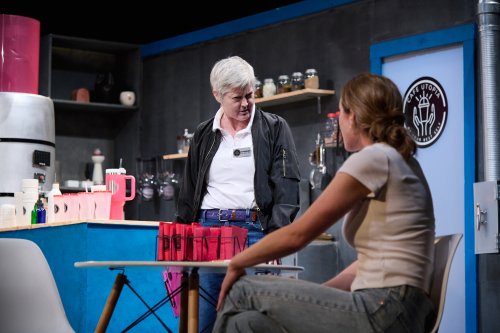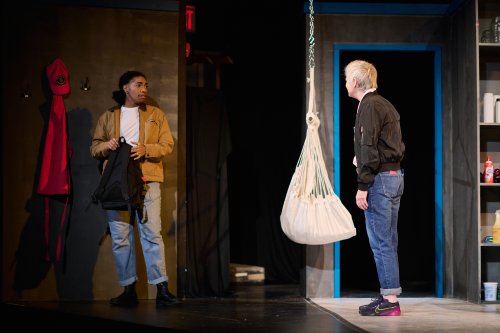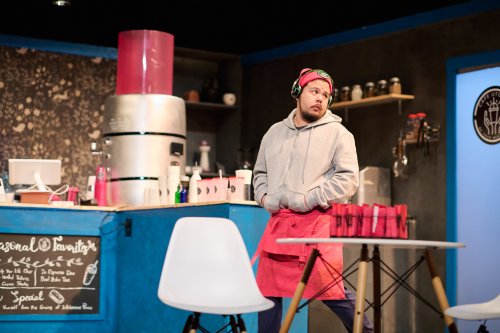Café Utopia
The tale of a juice bar that appears to be socially progressive, but behind the scenes, it is a different story.

Julia Atwood, Al Piper and Louis Reyes McWilliams in a scene from Gwen Kingston’s “Café Utopia” at the Hudson Guild Theater (Photo credit John Keon)
Imagine, if you will, that you are struggling to get started after a night of tossing and turning. Coffee is no longer the elixir you rely on for days like this but the wonders of a juice smoothie. For you, there is one special place to go to for that elixir. You are welcomed with a cheery voice and happy smile, and sometimes, depending on who is taking your order, they know what you want as you walk in the door.
Café Utopia by Gwen Kingston and directed by Ashley Olive Teague tells the tale of a juice bar that, on the surface, appears to be socially progressive, but behind the scenes, is a different story. Based on real stories from workers involved in the current efforts to unionize juice bars and coffee shops, this play lays bare the corporate behavior that puts profits before workers. During changes in some scenes, different characters read statements collected from workers about their work-related experiences. These moments are important in underscoring the overall content of the show as it relates to the plight of workers who lack union protection.
While the cast gives solid performances, the setting of the story in a juice bar, bordering on fantasy, detracts from the power of the discussion about corporate exploitation of workers and those workers’ efforts to unionize. The presentation, in a dramatic setting, of events that happened to real workers, while well done, is not as impactful as if presented in a more realistic setting.
The story opens with Ari (Al Piper) impatiently waiting to unlock the juice bar. They have worked at the store for 10 years and have an abusive partner. The job at the juice bar is their escape from the hellscape of their home. Piper is solid in their portrayal of a character who carefully hides their private life from everyone. Although they try to maintain a warm and friendly demeanor towards their co-workers, it still comes across as emotionally cool.

Kathleen Mary Carthy and Julia Atwood in a scene from Gwen Kingston’s “Café Utopia” at the Hudson Guild Theater (Photo credit John Keon)
Bex (Julia Atwood) is the person Ari is waiting for since the corporate rules require two employees to be present when the store is opened. Bex is a new employee who has only been on the job for ten days. When she arrives at the store, she is anxious and apologetic for being late. Atwood gives an excellent portrayal throughout of an anxious college student working part-time and desperately trying not to “screw up.”
The third element of the primary crew at the juice bar is Carlos (Louis Reyes McWilliams). He is a musician who supplements his club show income by working at the juice bar. In reality, if it were not for this second job, he would not be able to pay his rent. Café Utopia gives him the means to pursue his dream. McWilliams characterizes Carlos as a friendly, open person who likes to sing and play his ukulele.
Of these core employees of the flagship store of Café Utopia, only Ari has a 40-hour work week. Carlos only has 20 hours after being with the company for five years. It is one of the issues the play is bringing attention to. Corporations keep their costs down by limiting the majority of their staff to what amounts to part-time work, and in doing so, they don’t have to pay for healthcare or vacations, factors discussed as a part of the play.
Three other characters complete the ensemble. Dee (Kathleen Mary Carthy) is the store manager. She has been with the company from the beginning. Carthy perfectly embodies a manager who is highly supportive of her employees, but her dedication to the corporate ethos sometimes interferes with her “motherly” concern for the workers. Dee has something from her past that also plays an interesting part in the story: her relationship with the founder and owner, the youngest billionaire in American business.

Al Piper and Kathleen Mary Carthy in a scene from Gwen Kingston’s “Café Utopia” at the Hudson Guild Theater (Photo credit John Keon)
Sergio Mauritz Ang plays two characters in the story: Enzo and the Union Guy. Enzo is a character who manages the storeroom. He makes sure that everything that is needed is kept in stock. The character is a presence but with only peripheral engagement with the others. The Union Guy is a more critical aspect of the story. He appears at different points in the story without speaking and leaves pamphlets about forming a union.
The crew usually throws away the pamphlets without reading them, but Bex takes one out of curiosity and puts it in her pocket. This is the point where the idea of joining a union begins to become part of the story.
Two events drive the dramatic arc: the founder’s scheduled visit to the flagship store and the machine that makes the drinks breaks a few days before his visit. What happens after the machine breaks opens up the story to the discussion of corporations failing to care for their workers and, in this case, the machine that makes the business run.
A discussion follows about the lack of health insurance when a worker is injured using the defective machine. If the store is closed because of the broken machine, nobody will be paid until the store opens. The faulty machine pushes the once loyal crew nearly to the breaking point as they question the dedication of a company whose mission statement is spoken by Bex at the beginning of the play:

Sergio Mauritz Ang in a scene from Gwen Kingston’s “Café Utopia” at the Hudson Guild Theater (Photo credit John Keon)
Bex: “Our Mission is to heal, nourish, and uplift our customers and communities, one drink at a time. Here at Cafe Utopia every customer and order is unique. We treat everyone with the same radical respect regardless of gender identity, religion, or race.”
At the end of the show, the Union Guy has a conversation with Dee which answers questions about both characters, hinted at, but never explicitly laid out in the body of the work. The conversation provides a solid coda to the play.
Calypso Michelet is the scenic and costume designer. Her set gives a solid representation of a juice bar or coffee shop with a serving area leaving nothing to the imagination and tables and chairs filling the interior of the shop. The costumes perfectly define the characters both in and out of uniform. Megan Lang’s lighting design is effective in guiding the action. The sound design by Kate Short complements the lighting and helps underscore the change in scenes and moments within the scenes.
Café Utopia (through November 23, 2024)
Notch Theatre Company
Hudson Guild Theater, 441 West 26th Street, in Manhattan.
For tickets, visit http://www.notchtheatre.org
Running time: 90 minutes without an intermission




Leave a comment